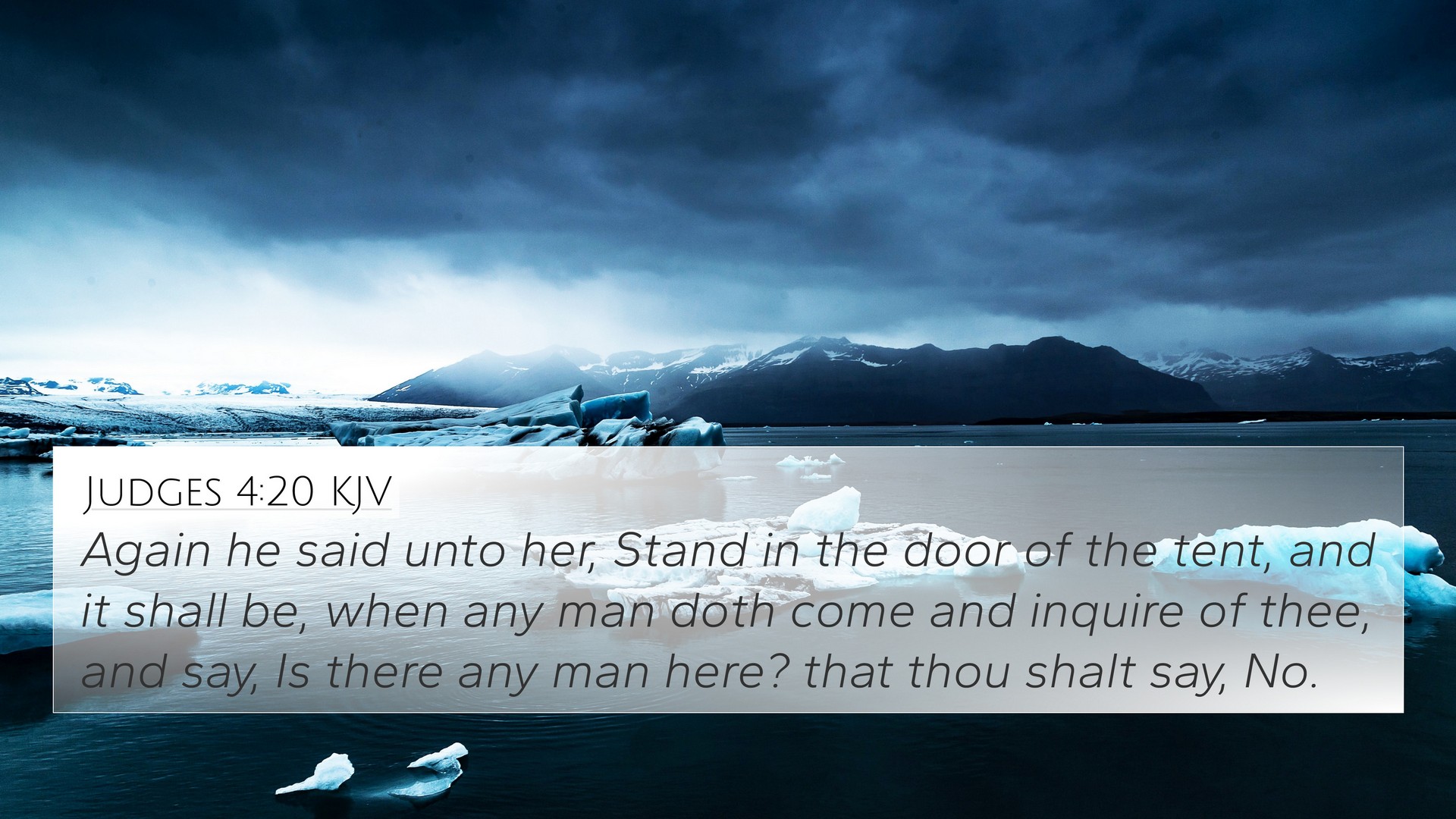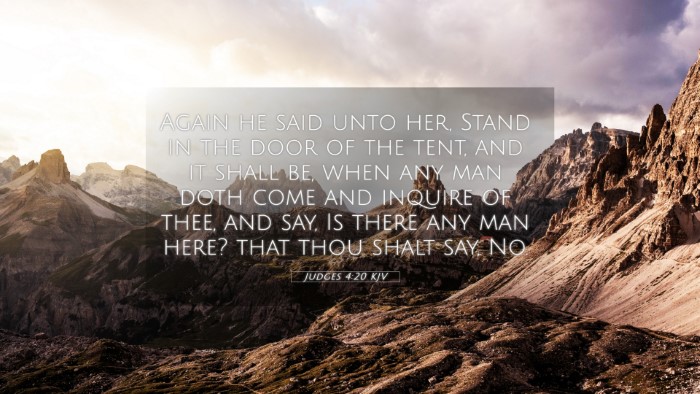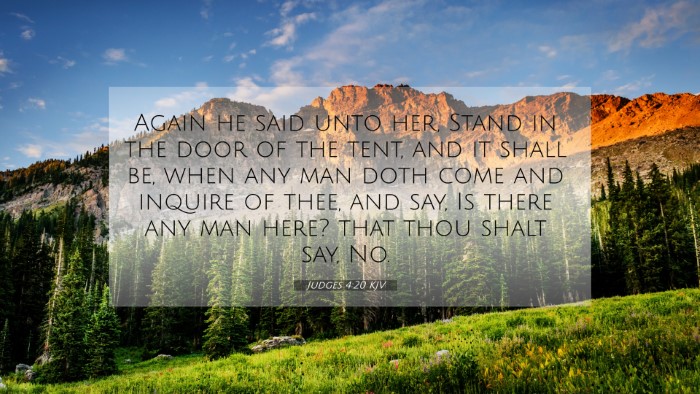Old Testament
Genesis Exodus Leviticus Numbers Deuteronomy Joshua Judges Ruth 1 Samuel 2 Samuel 1 Kings 2 Kings 1 Chronicles 2 Chronicles Ezra Nehemiah Esther Job Psalms Proverbs Ecclesiastes Song of Solomon Isaiah Jeremiah Lamentations Ezekiel Daniel Hosea Joel Amos Obadiah Jonah Micah Nahum Habakkuk Zephaniah Haggai Zechariah MalachiJudges 4:20 Similar Verses
Judges 4:20 Cross References
Again he said unto her, Stand in the door of the tent, and it shall be, when any man doth come and inquire of thee, and say, Is there any man here? that thou shalt say, No.
Uncover the Rich Themes and Topics of This Bible Verse
Listed below are the Bible themes associated with Judges 4:20. We invite you to explore each theme to gain deeper insights into the Scriptures.
Judges 4:20 Cross Reference Verses
This section features a detailed cross-reference designed to enrich your understanding of the Scriptures. Below, you will find carefully selected verses that echo the themes and teachings related to Judges 4:20 KJV. Click on any image to explore detailed analyses of related Bible verses and uncover deeper theological insights.
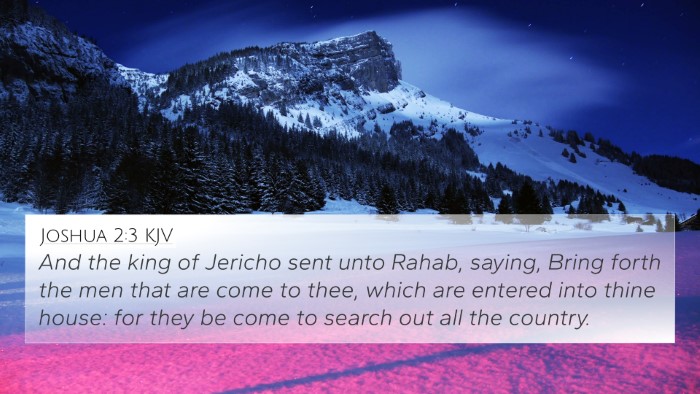
Joshua 2:3 (KJV) »
And the king of Jericho sent unto Rahab, saying, Bring forth the men that are come to thee, which are entered into thine house: for they be come to search out all the country.
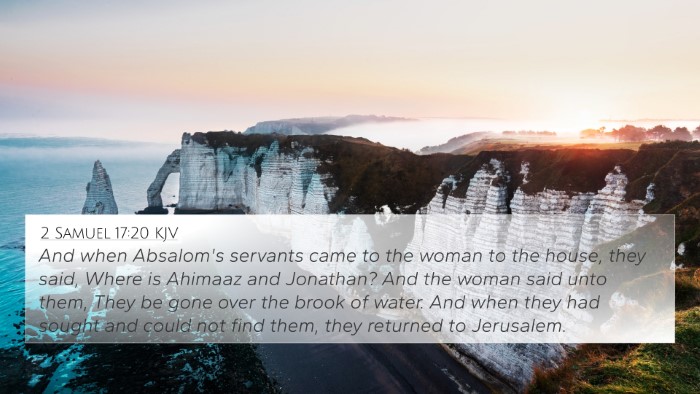
2 Samuel 17:20 (KJV) »
And when Absalom's servants came to the woman to the house, they said, Where is Ahimaaz and Jonathan? And the woman said unto them, They be gone over the brook of water. And when they had sought and could not find them, they returned to Jerusalem.
Judges 4:20 Verse Analysis and Similar Verses
Understanding Judges 4:20
Judges 4:20 states: "And he said unto her, If thou wilt go with me, then I will go: but if thou wilt not go with me, then I will not go." This verse captures a pivotal moment in the narrative of Deborah and Barak, highlighting themes of leadership, trust, and partnership in fulfilling divine plans.
Verse Context and Analysis
In this context, Barak, the military leader of Israel, seeks the counsel and presence of the prophetess Deborah to accompany him in battle against the Canaanites. His response signifies not just a request for assistance but a recognition of Deborah’s prophetic authority and moral support necessary for success.
Key Themes
- Dependence on God: Barak's reluctance to go without Deborah indicates a deep understanding of relying on God's guidance and presence through trusted leaders.
- Leadership Roles: This verse emphasizes the collaborative nature of leadership where male and female roles contribute to the success of God’s mission.
- Courage and Faith: Despite cultural norms of masculinity, Barak’s openness to seek help reflects his faith and courage in facing overwhelming odds.
Commentary Insights
Matthew Henry emphasizes the significance of Deborah's role, portraying her as a source of divine insight. He notes that Barak’s request illustrates the importance of divine wisdom in leadership and battle strategies.
Albert Barnes remarks on the implications of Barak’s conditionality in leadership. He notes that it reflects a lack of confidence and the necessity for spiritual assurance, highlighting the interplay between faith and action in Biblical narratives.
Adam Clarke provides insight into the societal dynamics at play, suggesting that Barak understood his limitations and sought collaboration. This reflects a broader principle applicable to contemporary leadership—valuing counsel from others.
Bible Cross-References
This verse is interconnected with several other Biblical passages that explore themes of leadership, reliance on God, and the role of women in scripture:
- Judges 4:4-5: Further establishes Deborah's role as a prophetess and leader of Israel.
- Genesis 2:18: Reflects on the partnership between man and woman as essential.
- 1 Samuel 10:23-24: Discusses the affirmation of God's chosen leaders.
- Philippians 4:13: Highlights reliance on God’s strength for undertaking tasks.
- Hebrews 11:32-34: Mentions Barak along with notable figures demonstrating faith.
- Exodus 17:9: Another example of seeking help in battle situations (Moses and Joshua).
- Proverbs 15:22: "Without counsel plans fail, but with many advisers they succeed," correlating to the need for guidance.
Exploring Connections Between Bible Verses
This verse invites a deeper exploration of thematic Bible verse connections and inter-Biblical dialogue. It sets a precedent for understanding how God works through various individuals regardless of societal roles or expectations, thus offering rich ground for comparative Bible verse analysis.
Practical Applications
The insights gained from Judges 4:20 can be applied practically in various aspects of life:
- In Leadership: Emphasizing the importance of consulting with others and relying on trusted partners for guidance.
- In Personal Faith: Encouraging individuals to seek divine wisdom before making significant decisions.
- In Community: Building supportive networks that acknowledge the contribution of every individual, regardless of gender.
Concluding Thoughts
Judges 4:20 serves as a powerful reminder of the collaborative nature of leadership and the importance of divine counsel. It emphasizes that God’s plans are often realized through a community of faith, illustrating how pieces from various Biblical texts link together to provide a holistic understanding of God’s work throughout history.
